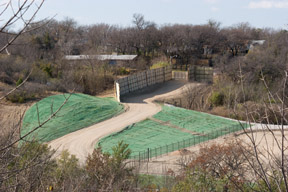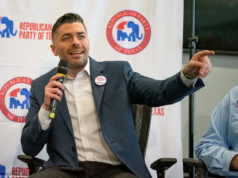Rules for gas wells are changing, but the fight’s not over.
By Peter Gorman
After months of meetings, citizen outrage, industry resistance, and relatively little official action, the next few months could bring about sizable changes in government regulation of the gas drilling boom that is profoundly affecting Fort Worth neighborhoods, finances, and environment.
For Fort Worth proper, much of the picture of gas drilling regulation was decided at a city council meeting on Dec. 9, and other key decisions were made late Tuesday. To call the process leading up to the ordinance’s adoption contentious and confusing would be an understatement. In effect, in the city’s second try at drilling regulation, a heavily industry-oriented task force came up with one set of recommendations, the dissenting neighborhood representatives on the panel wrote a separate and very different report, and city staffers took both documents and made a third proposal that satisfied neither of the other groups. On Tuesday, the city council rejected one staff-made change that would have weakened the ordinance and modified a second one. 
Outside Cowtown, a recent court ruling in Grand Prairie could turn out to have widespread consequences. And when the Texas Legislature convenes in January and new leadership takes over in Washington D.C., the natural gas industry could find itself with new state and federal rules affecting everything from disposal of drilling wastes to the taking of land for pipelines.
At the federal level, the appointment of U.S. Rep. Henry Waxman of California to chair the House Committee on Energy and Commerce suggests more federal regulation of the drilling industry may be coming because he has been an outspoken opponent of “fraccing,” the process of gas well drilling. One of the first indicators may be the fate of a bill introduced earlier this year that could substantially change the way drillers get rid of the highly toxic waste fluids from the fraccing process. Currently, when drillers put those wastes back in the ground in what they call “saltwater” injection wells – the industry’s favored method for waste disposal at the moment – they are exempt from requirements that those wells not contaminate drinking-water sources. But the bill introduced by two congress members from New York and Colorado would end that exemption from the federal Safe Drinking Water Act and put injection wells under federal law.
Disposal wells are only one of many aspects of Barnett Shale drilling that North Texans had no clue about when companies started asking property owners for mineral leases a few years ago. Another was the compressor stations that have sprung up all over the city and countryside, which move the gas coming in from wells into larger pipelines. In Grand Prairie, citizens pushed for and got a local ordinance regulating the appearance of the compressor stations. Chesapeake Energy’s pipeline division sued, but a Dallas federal judge last month ruled in favor of the city. Chesapeake is expected to appeal further.
State Rep. Lon Burnam said he plans to make drilling regulation “the focus of my legislative work” in 2009. “There are a lot of health and safety issues to be addressed with urban drilling,” the Fort Worth Democrat said, and he plans to file bills on topics ranging from beefing up the Texas Railroad Commission’s well inspection staff to requiring odorization of gas, dehydration, and/or pressure limits for gas in gathering lines.
All those items sound like statewide matters, but Craig Adair, Burnam’s legislative director, said the lawmaker is hoping to give the bills a better chance of success by limiting their application to Tarrant County.
“With the concentration of drilling in an urban area, we’re looking to make changes in laws that reflect that populace,” Adair said. “We’re not looking to change laws for folks who have ranches out in West Texas.”
Burnam said he is already “working on generating that bipartisan support” that would be needed to get even local-only bills on the subject passed.
Gary Hogan, a drilling task force member who has fought for years for better regulation of the industry, said the Fort Worth group was in part hamstrung because some issues, like pipeline regulation, are the province of the state government, not cities. “We’re going to have to go further, to get the state politicians to begin enacting laws that protect citizens,” he said. “That’s where a number of these changes are going to have to come from.”
With the Dec. 9 passage of the new Fort Worth ordinance, some major changes were put in place. New provisions that have made anti-drilling activists and neighborhood representatives happy include giving the gas company responsibility for mapping and inventorying gas pipelines, improved erosion control at well pad sites, and a requirement that gas companies use a closed-loop mud system when drilling or reworking wells. In the closed-loop system, drilling waste is cleaned up at the site and re-used, rather than being allowed to evaporate in sludge pits. The method cuts down considerably on the volume of airborne toxins released from the sludge.
There are also new requirements for controlling sound from both drilling and compressor stations and for landscaping around compressor stations and well pads. Additionally, compressor stations will be restricted to agricultural or industrially zoned areas and must be enclosed in buildings to mitigate problems with sound and escaping gas.
The council also passed a resolution encouraging the state to fund an environmental impact study of urban gas wells and called on the Railroad Commission to make additional pipeline and well inspections – some of which could be dealt with in Burnam’s legislation, if it passes.
The remaining areas addressed on Tuesday could have favored the gas companies. Neighborhood representatives and community activists were particularly upset that several changes were made to the proposed ordinance after they were shown what was supposed to be the final draft.
One of those changes was to much more narrowly define what a public building is, for setback purposes.
The city staff “changed the definition of a public building,” which affects how far away from structures a well site must be,” Hogan said. The new definition leaves businesses such as stores, restaurants, bars, and movie theaters out of the definition. That change was mostly accepted by the council, but jails and hotels were added back as public buildings.
“If the issue is safety, any building utilized by the public in any manner ought to be included,” Hogan said.
Hogan is also upset that city staffers recommended changing the setback for multiple-well pad sites from 600 feet to 525 feet. That change, which might appear minor, could have had huge ramifications at several drilling sites where a single well permit has been granted, but where companies are planning to drill several additional wells. The setback change was rejected by the council, however.
At a site on Scott Avenue in West Meadowbrook that had been granted a single-well permit, plans were discovered indicating that Chesapeake intends to put nearly two dozen wells there. With the 600-foot setback remaining in place, Chesapeake will have to apply for permits for the additional wells because they would be too close to homes. But with the shorter setback, Chesapeake would have been allowed to disrupt the lives of those homeowners with years of drilling without having to submit to public hearings on the extra wells. A single-well setback from public buildings and residences is measured from the well bore. But in a multiple-well site the setback is measured from the outer edge of the pad.
“That [recommendation] was changed … by city staffers,” said Hogan. If it had passed, he said, Fort Worth would have seen “multiple wells on an awful lot of sites throughout the city. That’s great for the drillers but simply awful for the people of Fort Worth. Obviously the city staff was heavily lobbied by the gas companies for those changes.”
The lobbying began shortly after the city staff presented what was to be the final draft of the new gas drilling ordinance in early November. To the surprise of many on the task force, city staffers took much from the minority report and came up with a proposal that looked to strengthen Fort Worth citizens’ position in several areas, particularly with regard to noise and air pollution as well as how far back wells must be placed from inhabited buildings.
“We were pleased that so much of the minority report was mirrored by what the city staff adopted,” Susan De Los Santos, a member of the task force minority, told the Weekly. But, she added, “the gas companies were not happy.”
In fact, “Chesapeake was furious,” wrote Jim Bradbury, another member of the minority on the task force, in a widely circulated e-mail.
That fury took the form of a public pout at a town hall discussion of the ordinance on Nov. 20. Citizens who showed up for the 7 p.m. meeting discovered that Chesapeake had already packed the meeting hall and the parking lot with nearly 850 oilfield workers, contractors, subcontractors, and others, who had been told to arrive at 5 p.m. to fill the space. Due to limits on the meeting space, most local citizens were turned away. The meeting itself wound up lasting only 40 minutes, instead of the planned two hours.
Considering the uproar that followed, Chesapeake’s action seemed to have backfired. But within days, city staff had rewritten several sections of the ordinance.
In a flurry of late-November e-mails about the proposed change in the setbacks, council member Kathleen Hicks noted, “This is scary; if true I certainly will not support that.”
Greg Hughes, of the Coalition for a Reformed Drilling Ordinance (CREDO) was one of many who have taken issue with the staff’s actions on the ordinance. “What we’ve got now is a document put together by the city staff,” he said. “While some might see this new ordinance as progress, it still doesn’t address the central issues of the problem with gas drilling. We still don’t have an understanding of the environmental impact of drilling in an urban environment.”
CREDO, a loose-knit group of some of Fort Worth’s more influential politicos, wants a drilling moratorium in order to have that sort of study done. “The fact is that we don’t yet know what we’re dealing with, so who knows if the new ordinance, for all its heart, will put in place the changes we need in the long run,” Hughes said.
Mayor Mike Moncrief said Tuesday that, “We don’t have a perfect ordinance yet,” but that the city council is looking for a middle ground. Anyone who thinks the city isn’t trying to address quality-of-life issues, he said, is “sadly mistaken.”
You can reach Peter Gorman at
peterg9@yahoo.com.











